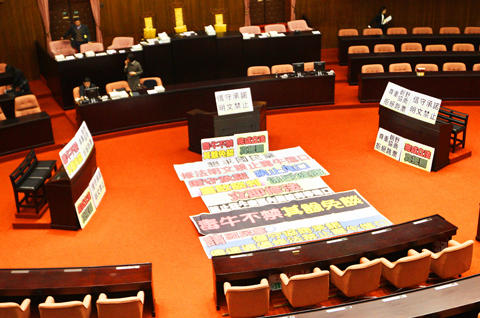Legislators yesterday again failed to deliver on a promise to come to a consensus on amending the Act Governing Food Sanitation (食品衛生管理法) to address perceived flaws in the Taiwan-US protocol that allows the entry of what some lawmakers have called “unsafe US beef products.”
Legislators initially set a deadline of Nov. 17 to amend the legislation based on the agreed conclusion reached at a cross-party negotiation meeting, however, lawmakers last Friday postponed the deadline to yesterday, but a settlement is still not in sight.
The Democratic Progressive Party (DPP) caucus yesterday revised its original version. The original banned imports of skull, brains, eyes, spinal cords, ground beef and intestines from “areas affected by mad cow disease or areas with a history of the infections,” while the new version banned such products from “areas affected by mad cow disease or areas with a history of the infection in the last 10 years.”

PHOTO: CNA
The Act had allowed the import of US ground beef and intestines, but if the amendment passes, such imports would be banned from entering the country because the US discovered its third mad cow disease case in 2003.
“The latest DPP version was close to the [KMT caucus’] position, but the Presidential Office still has concerns over violation of the protocol,” KMT caucus whip Lu Hsueh-chang (呂學樟) said.
“If the Presidential Office is OK with the DPP’s version, the KMT caucus will support it. If not, we hope the Office will explain to the public its reasons,” Lu said.
The KMT’s latest proposal says that skulls, brains, eyes and spinal cords imported from areas where mad cow disease has been reported in the past 10 years should be banned from entry and ground beef and intestines without examination credentials issued by exporting countries that it has been thawed and passed batch-by-batch inspections should not be allowed entry.
The legislative plenary session, scheduled to review bills, sat idle the whole day yesterday because of the disagreements.

Trips for more than 100,000 international and domestic air travelers could be disrupted as China launches a military exercise around Taiwan today, Taiwan’s Civil Aviation Administration (CAA) said yesterday. The exercise could affect nearly 900 flights scheduled to enter the Taipei Flight Information Region (FIR) during the exercise window, it added. A notice issued by the Chinese Civil Aviation Administration showed there would be seven temporary zones around the Taiwan Strait which would be used for live-fire exercises, lasting from 8am to 6pm today. All aircraft are prohibited from entering during exercise, it says. Taipei FIR has 14 international air routes and

Taiwan lacks effective and cost-efficient armaments to intercept rockets, making the planned “T-Dome” interception system necessary, two experts said on Tuesday. The concerns were raised after China’s military fired two waves of rockets during live-fire drills around Taiwan on Tuesday, part of two-day exercises code-named “Justice Mission 2025.” The first wave involved 17 rockets launched at 9am from Pingtan in China’s Fujian Province, according to Lieutenant General Hsieh Jih-sheng (謝日升) of the Office of the Deputy Chief of the General Staff for Intelligence at the Ministry of National Defense. Those rockets landed 70 nautical miles (129.6km) northeast of Keelung without flying over Taiwan,

The Ministry of National Defense (MND) today released images of the military tracking China’s People's Liberation Army (PLA) movements during the latest round of Chinese drills around Taiwan. The PLA began "Justice Mission 2025" drills today, carrying out live-fire drills, simulated strikes on land and maritime targets, and exercises to blockade the nation's main ports. The exercises are to continue tomorrow, with the PLA announcing sea and air space restrictions for five zones around Taiwan for 10 hours starting from 8:30am. The ministry today released images showing a Chinese J-16 fighter jet tracked by a F-16V Block 20 jet and the

City buses in Taipei and New Taipei City, as well as the Taipei MRT, would on Saturday begin accepting QR code payments from five electronic payment providers, the Taipei Department of Transportation said yesterday. The new option would allow passengers to use the “transportation QR code” feature from EasyWallet, iPass Money, iCash Pay, Jkopay or PXPay Plus. Passengers should open their preferred electronic payment app, select the “transportation code” — not the regular payment code — unlock it, and scan the code at ticket readers or gates, General Planning Division Director-General Liu Kuo-chu (劉國著) said. People should move through the